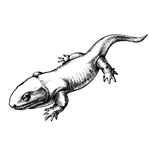Search - All Results
431 - 440 of 515 results
-
New study explains how fish got their fingers
New analysis of anatomical evidence shows how the limbs of land vertebrates (such as mammals and reptiles) originated from the fins of water-bound fishes. -
Three Innovation Fellows appointed to lead research on infectious diseases
Three Innovation Fellows have been appointed, including two at the RVC, to undertake studies aimed at producing new diagnostic tools for infectious diseases. -
RVC honours UC Davis Dean, Dr Michael Lairmore, with Honorary Fellowship
This honour was granted to Dean Lairmore in recognition for his outstanding leadership in veterinary medicine and One Health, and was presented during the RVC’s Annual Principal’s Dinner. -
Young, male and crossbred cats at most risk of road accidents
Being young, male and crossbred increases a cat’s chances of being hit by a car, according to the findings of a new paper published today. -
World-First Surgery Combination Saves Puppy’s Life
Surgeons from the Royal Veterinary College (RVC) have successfully carried out the surgical repair of a complex combination of heart defects in a dog. The abnormalities required tricuspid valve repair surgery along with the repair for the common atrium. It is the first time these procedures have been carried out on a dog in the same operation. -
Hertfordshire Local Enterprise Partnership awards RVC £7m grant to build leading One Health Vaccine and Stem Cell research centre
The RVC has been awarded a £7 million grant by Hertfordshire Local Enterprise Partnership to support the creation of a state-of-the-art Veterinary Vaccinology & Cell Therapy Hub on its Hawkshead campus -
Chocolate Labradors have shorter lifespan than rest of the breed
Chocolate Labrador Retrievers have a significantly shorter lifespan than their black and yellow counterparts, according to the results of the largest study ever done of the breed in the UK. The median lifespan for chocolate Labradors is just 10.7 … -
Wildebeest muscles almost three times more efficient than a car engine
Wildebeest muscles have an extremely high efficiency of 62.6%. By comparison, most animal muscles and a car engine are only 25% efficient -
RVC joins forces with tech start up; Felcana
RVC joins forces with tech start up; Felcana -
New Study Reveals 'challenge focused' veterinary graduates will experience higher job satisfaction
A new study published in Veterinary Record by academics at the Royal Veterinary College (RVC) has revealed that new veterinary graduates typically adopt one of two professional identities; one of which is associated with job dissatisfaction while the other is more likely to result in them enjoying their career as a vet more.A new study published in Veterinary Record by academics at the Royal Veterinary College (RVC) has …









